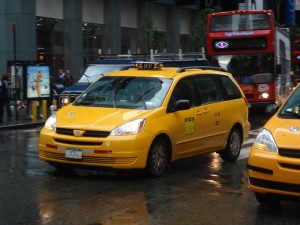Why do Uber and Lyft think they don’t have to pick up passengers with disabilities?
by Beth
 Back in 2014 the Chicago Tribune published an op-ed piece I wrote that was titled “Should ride-sharing services adhere to the Americans with Disabilities Act?” Five years have passed, and Lyft and Uber still claim they don’t have to follow ADA guidelines.
Back in 2014 the Chicago Tribune published an op-ed piece I wrote that was titled “Should ride-sharing services adhere to the Americans with Disabilities Act?” Five years have passed, and Lyft and Uber still claim they don’t have to follow ADA guidelines.
A story in Politico last week reports that Lyft is fighting a federal class action lawsuit filed in New York’s Westchester County on the grounds that “it is not in the transportation business.”
Ahead of its public offering, Lyft acknowledged it has been involved in legal battles about its ongoing refusal to comply with the Americans with Disabilities Act. From The Politico story :
“For a company that says they want to do the right thing — they should do the right thing,” said attorney Jeremiah Lee Frei-Pearson, who is representing the plaintiffs in the New York class action lawsuit. “Not serving people with disabilities is very inconsistent with the public message that Lyft wants to send as being an inclusive and progressive company.”
Suits have been filed against Uber, too, and Uber also maintains that its drivers do not have to follow the Americans with Disabilities Act (ADA). Attorney Frei-Pearson told Politico that he and his colleagues have been reluctant to sue Uber at the same time they bring up this case against Lyft because of all the other other national litigation against Uber.
The Politico story says, “Lyft continues to bill itself as a better-behaved version of arch-rival Uber,” and Campbell Matthews, a spokesperson for Lyft, wrote in an emailed statement to Politico that “We think about accessibility broadly and know that many who were previously underserved by transit and taxis are now able to rely on Lyft for convenient and affordable rides.”
So does that mean it’s okay to refuse riders with disabilities? The ADA says “public transportation authorities may not discriminate against people with disabilities in the provision of their services,” but Uber and Lyft identify themselves as technology companies — not transportation companies. The drivers are independent, they drive their own vehicles, so Uber and Lyft feel they are not required to provide ADA-mandated vehicles and rides.
I try to avoid using ridesharing companies on principle and have only taken about a dozen rides on Uber and Lyft over the years. Only one driver refused to take me with my service dog, and that was a Lyft driver. Without the law on my side, my only recourse was to call another driver and hope they’d take me. It all makes me feel unworthy.
Whenever possible, I ride in a registered cab rather than using a ridesharing service. Cabs that are registered are part of a public transportation authority, registered cab drivers go through a lot of training to get their cab licenses, they are professional drivers, they know where they’re going, and when I call for a ride, I have the law on my side: the ADA prohibits public transit authorities from discriminating against people with disabilities in the provision of their services. And then there’s this: I tip well!
Now, that doesn’t guarantee that registered cab drivers will pick me up with my Seeing Eye dog, but it does guarantee I have recourse. When we moved to Chicago in 2003 I filed formal complaints with the City of Chicago after two separate cab drivers refused to take me with my Seeing Eye dog. Both drivers had their license revoked for a month, and both were fined. I haven’t been refused a ride from a registered cab for years. I think that’s because they know the law.
I get the utility of Uber and Lyft. Especially outside of major cities and downtowns. But, by all accounts, they cut every corner they can. So whenever possible, I’ll cut them out, too.







January 12th, 2022 at 12:46 pm
My brother in laws car is not equipped to handle an electric wheelchair , thus he cannot pick up an physically challenged person. So what’s he supposed to do other than politely tell the person why he cannot pick them up. He does not have the
Money required to make his car ADA adaptable.
June 21st, 2021 at 12:42 am
how do we unite . i have had 3 strokes MS and other issues . autoimmune . i have an assist device . lyft had a critera , about 2 years ago as did uber . i was in healthcare . not always disabled am over 55 and this is for all . please send to email so that we might advocate . this is ridiculous ” all inclusive ” is what it legally falls under . signed passionate
May 29th, 2019 at 10:20 am
That’s unconscionable. Especially for the person who was not allowed to drive his lift-equipped vehicle when there’s obviously a need and a rider-base who would happily use it. It does bring up that very few traditional cab companies have lift equipped vehicles, which (again) leaves out a large population who require that basic necessity to move about. Even when they do, you’d need to reserve one of the few they have in advance, because you’re waiting for a significantly smaller pool of vehicles.